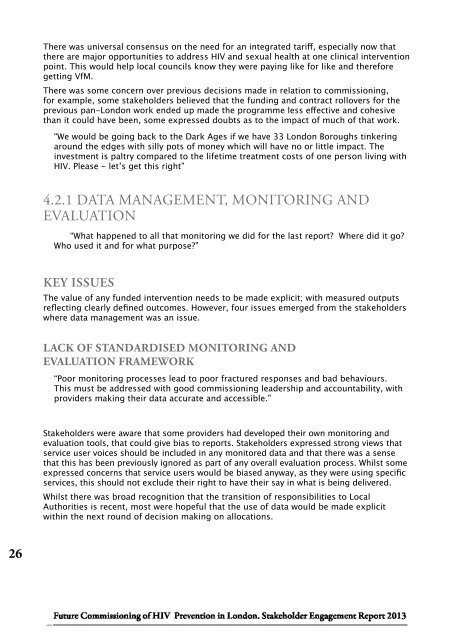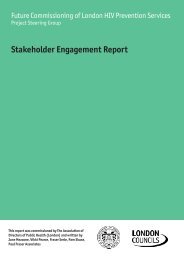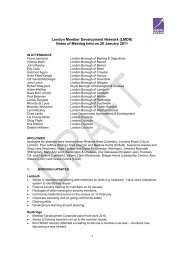Stakeholder Engagement Report - London Councils
Stakeholder Engagement Report - London Councils
Stakeholder Engagement Report - London Councils
Create successful ePaper yourself
Turn your PDF publications into a flip-book with our unique Google optimized e-Paper software.
There was universal consensus on the need for an integrated tariff, especially now that<br />
there are major opportunities to address HIV and sexual health at one clinical intervention<br />
point. This would help local councils know they were paying like for like and therefore<br />
getting VfM.<br />
There was some concern over previous decisions made in relation to commissioning,<br />
for example, some stakeholders believed that the funding and contract rollovers for the<br />
previous pan-<strong>London</strong> work ended up made the programme less effective and cohesive<br />
than it could have been, some expressed doubts as to the impact of much of that work.<br />
“We would be going back to the Dark Ages if we have 33 <strong>London</strong> Boroughs tinkering<br />
around the edges with silly pots of money which will have no or little impact. The<br />
investment is paltry compared to the lifetime treatment costs of one person living with<br />
HIV. Please - let’s get this right”<br />
4.2.1 Data management, monitoring and<br />
evaluation<br />
“What happened to all that monitoring we did for the last report? Where did it go?<br />
Who used it and for what purpose?”<br />
Key Issues<br />
The value of any funded intervention needs to be made explicit; with measured outputs<br />
reflecting clearly defined outcomes. However, four issues emerged from the stakeholders<br />
where data management was an issue.<br />
Lack of standardised monitoring and<br />
evaluation framework<br />
“Poor monitoring processes lead to poor fractured responses and bad behaviours.<br />
This must be addressed with good commissioning leadership and accountability, with<br />
providers making their data accurate and accessible.”<br />
<strong>Stakeholder</strong>s were aware that some providers had developed their own monitoring and<br />
evaluation tools, that could give bias to reports. <strong>Stakeholder</strong>s expressed strong views that<br />
service user voices should be included in any monitored data and that there was a sense<br />
that this has been previously ignored as part of any overall evaluation process. Whilst some<br />
expressed concerns that service users would be biased anyway, as they were using specific<br />
services, this should not exclude their right to have their say in what is being delivered.<br />
Whilst there was broad recognition that the transition of responsibilities to Local<br />
Authorities is recent, most were hopeful that the use of data would be made explicit<br />
within the next round of decision making on allocations.<br />
26




